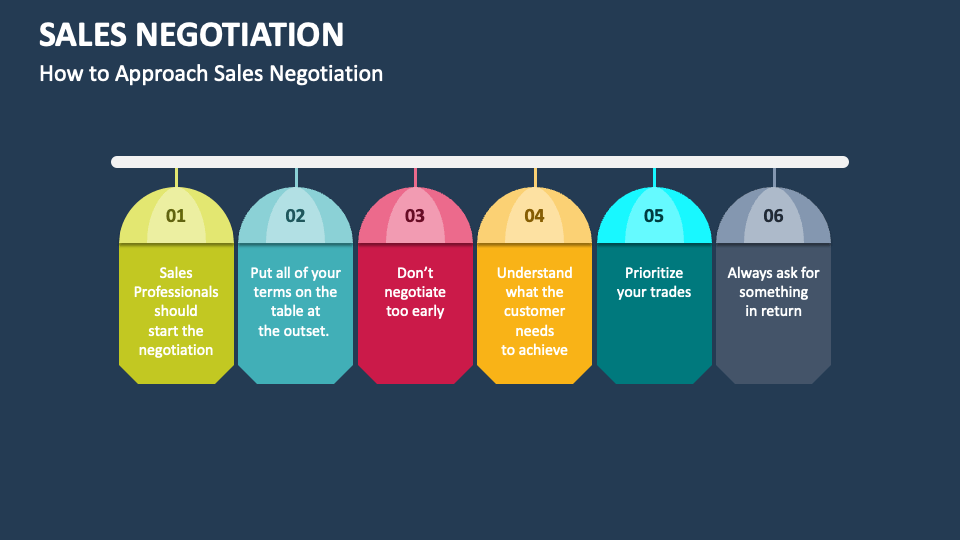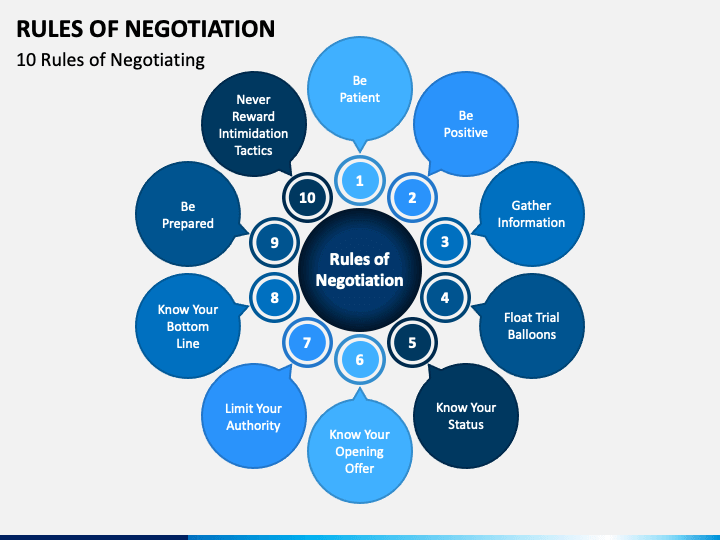
- jaro education
- 3, April 2024
- 10:00 am
The fundamental rules of every sales negotiation are identical, irrespective of the negotiation skills shown to the customers, investors, or partners. The onus lies with sales professionals to create agreements with parties carrying varied interests and objectives. The usual notion about sales professionals is expensive suits, slick rhetoric, or charisma. However, it is different. It is about value addition and making the way out of the comfort zone to manage things with a positive gesture.

Table of Contents
*collidu.com
Negotiations are usually the most challenging aspect of any sales professional’s career path. Even proven sales executives of a reputed company may get nervous occasionally when closing a promising deal. The reason is profit factor, and sales deals may turn towards success or failure during the negotiation process.
The most important realization is that no one is born with negotiation skills. Instead, candidates who choose this line for their career must learn, practice and hone their marketing skills before becoming proficient negotiators. Suppose the sales manager wants to master these skills to maximize profit, grab rates, and find scope for repeat business. In that case, he should grasp the prevailing negotiation skills and techniques.
What is Negotiation?
From a broader perspective, a fruitful sales negotiation confirms that both the parties (the seller and the buyer) have gained from the end agreement. The negotiation skills and techniques help them mutually comply with sales deals that favor the requirements of buyers and sellers. The most effective sales negotiations result in impressive metrics across the board through successful conversion.
On a more delicate note, sales negotiations can assist sales professionals and prospects. Negotiation in sales renders buyers the freedom to share their apprehensions and enable sellers to showcase their inherent intentions in resolving those concerns. Sales negotiations help companies finalise more deals, communicate effectively with more buyers and return to sales targets more prominently.
It is a common observation that a sales negotiation implies that one of the parties makes compromises concerning offer details, price or contract clauses to reach a mutually agreeable result. Sales negotiation frequently pertains to the price or cost of the products or services. However, there are exceptions. The negotiation process might occur around timing, contract length, support level, discounts, and bonuses integral to the offer.
This structure signifies a withdrawal from how sales professionals treat sales negotiations. The negotiation does not relate to an argumentative or bargaining procedure. On the other hand, the opposite scenario may make sense, provided the marketing company has robust negotiation skills. Sales negotiation, however, can be a one-time workout or may continue for several days intermittently till the mission is complete.
How Negotiation in Sales Serves the Sales Process?
You have already gone through ‘what is negotiation,’ which involves conversations between potential buyers and sellers in a crucial sales process. The sales executive closes the deal in favour of his employer. The ultimate goal is to enter into a contract that sets the scenario for an ever-growing and fruitful bond between the seller and the buyer. The whole process requires essential negotiation skills from the sales personnel. These traits include preparedness, empathy and communication abilities.
In the sales process, the element of negotiation should come at the finishing line. Meanwhile, the sales professional pitches for a specific product and gives a demo of the product or service. Besides, the sales executive distinctly identifies the critical decision-making stakeholders. Next is the time to initiate negotiation terms to satisfy the parties with the proceedings.

*rainsalestraining.com
Stages of Negotiation in Sales
The negotiation skills and techniques involve four prominent steps:
- Preparation: Preparing for the negotiation is the most vital step for closing the deal. The sales professional must ensure he adequately understands both sides of the relevant conversation and be on guard for any possible obstructions that may crop up during the conference. The sales personnel should also chalk out a clear agenda incorporating the discussion points and implementation of those contentions during the meeting. You need to share the agenda with your prospect for an effective negotiation.
- Primary Exchange: As soon as the meeting starts, both parties should gear themselves up to set the required terms and conditions for the deal. The chosen sales crew should raise pertinent questions about the prospect’s objectives, potential hurdles, or any stiff negotiating points the customer wants to drive in.
- Collaboration: It is the most critical stage, and it tests the negotiation skills of the marketing firm. It is always natural that there will be differences of opinion during negotiations. Therefore, sales professionals must collaborate with the prospects to decide the extent of sacrifices each party makes to reach a mutually acceptable agreement.
- Commitment: The verbal agreement comes first before closing the deal. However, documentation is a must to avoid future litigation. The sales team must establish a formal agreement (contract) and get it duly signed and approved by the participants.
These steps look easier on paper, but when you put them into practice, you may face serious challenges. Therefore, as a trainee aspiring to become a capable marketing manager, you need to dig into the following 12 essential negotiation skills for sales professionals.
Top 12 Essential Negotiation Skills for Becoming a Successful Sales Manager
There is no denying that experience plays a pivotal part in training programmes for marketing and sales professionals across the globe. However, you can also benefit from the proven experiences of others in a similar trade. The following are the 12 selective and robust negotiation skills techniques that a sales personnel can use to close prospective deals and streamline the sales cycle for promising career growth:
1. The Instinct and Aptitude to Walk Away
Before the sales executive engages in any negotiation, the foremost factor is to get familiar with the price structure. It denotes the optimal stage when you decide to walk away from the all-important negotiation because you have the intuition that the negotiation has no merit and is time-consuming. The sales professional knows he has to reach a win-win situation, which is part of his job. However, in certain situations, it is no longer realistic and feasible. You should draw a line of restriction and ensure you do not cross that intangible line. It saves you from exerting your valuable time and energy in a negotiation which will never allow conversions.
2. Sometimes, Silence is the Best Approach
Silence often signals a creative sales negotiation when conversing on the phone or in person. Anticipating the timing of keeping quiet also implies when to listen to others. Suppose you must understand when you should stop talking and focus on listening to others’ narratives. If you don’t, the prospects may get the impression that you, as a sales professional, are self-centred and self-serving. These are cliche marketing practices that should take a back seat. It is a fact that the negotiation periods are typically limited, and within a specific time frame, you have to convince the customer. Still, you must leverage the customer to express his views without interruptions. You may gather positive clues out of their needs and motives. So, listen patiently and gather valuable information before you start a further conversation.
3. Confirm the Negotiation with the Right Person
Negotiation skills only work when you encounter a prospect with decision-making authority. You must confirm it to save your valuable time and resources. The most paramount objective in this regard is negotiating with the right individual. From the beginning, the sales team should connect with the decision-maker. Moreover, suppose the sales executive representing the company starts negotiating at lower levels. In that case, he might face the awkward situation of allowing many discounts on the product before eventually approaching the decision-maker. When he finally approaches the competent authority, he will have conceded significant discounts and lose the opportunity for bargaining.
4. Allow Measure of Control to the Customer
Have you observed a futile sales conversation and negotiation failure? In such a scenario, there is always a solution, such as applying a magical four-word sentence to enable you to get the intended dialogue going. These words are “Help me out there.” This gesture of asking for help moves the dynamics of dialogue and assists the prospect in getting flexible. Consequently, a meaningful conversation could happen in favor of the sales team. Sales professionals must try to impress buyers by showing them they are in total control of the deal. In this way, the sales team can capitalise on the buyers’ need for control as a motivator and make them convert the negotiation into a productive sales deal.
5. Discourage Single-Handed Negotiation
You might possess inborn negotiation skills. Despite that, the act of negotiation virtually consumes time and energy. The longer you find yourself in a sales deal, the more emotionally engaged you become in striking a profitable agreement, irrespective of the terms and conditions. At this juncture, an effective negotiation strategy is to pair up with your colleague who has not participated in the deal until now and is not a stakeholder.
The fresh induction will help you optimize the negotiation process and guarantee that you have kept your attention on the ongoing deal. For trainee sales managers, pair (shared) negotiation is a decent idea. Pairing management trainees with proven sales professionals can be a significant measure in settling a sales deal.
6. Ascertain the Negotiation Style
When people ask, ‘What is negotiation?’, the market exponents often refer to Wall Street players who dominate the realm of stock investments by manipulating them to earn the maximum output. It should not be a way of negotiating with the prospects. The negotiation style should include friendly strength. It infers to be cordial and modest but consists of a firm standing when it matters. It would help if you channeled your confidence in the product and expertise in your domain to explain the qualities without losing calm and patience.
7. Anchor the Negotiation Terms
The concept of anchoring is a psychological advantage essential for the sales professional to set the tone of discussion that will prevent you from allowing significant discounts. It is a general tendency to ask the customers’ budget before offering the price and starting any negotiation. However, the sales trainers say adopting the opposite course helps the deal. It will help if you begin by anchoring your terms and conditions. You can establish a fair conversation if you are the first to make an offer. Several studies have shown that whoever makes the initial offer during negotiation gets the upper hand in the entire negotiation.
8. Flipping Questions is Always Beneficial
During any product negotiation, the prospect might pose several questions that you are unable to answer or unwilling to answer without the consent of your superiors. It would help if you did not answer without any logic. Instead, you can flip the question back. To illustrate:
- In all situations, what would be the answer, according to you
- How is this relevant to the present scenario?
- Why is this point vital for you?
Shifting the onus back to the prospects can be a positive way to find creative opportunities for significant value addition.
9. Get Familiar with the BATNA
Negotiation skills and techniques also comprise BATNA. This word is prevalent for sales professionals during negotiation. It denotes the Best Alternative to a Negotiated Agreement. It entails getting hold of the best alternative in case the negotiation is not imminent and the sales agreement does not materialise. If you know your options, you will understand that the deal is no longer worth pursuing, and you have lost the negotiating power. Contrarily, getting familiar with the best alternatives for your prospect can immensely assist you during negotiations. It helps you by highlighting the problems with the exact backup plans and vests you the necessary power to negotiate superior terms for all involved.
10. Make Everyone Satisfied
The sales team understands that positive results are only scarcely possible. However, an efficient negotiator must display his negotiating skills to try his best to satisfy the prospects. The ideal way to create a win-win scenario is to build long-term customer relationships for future conversions. Negotiations are virtually the beginning of accomplishing long-term business bonding and acquaintances. If the sales manager is too enthusiastic to put the business interest first, the relationship with your clients will be short-lived.
As you know, negotiation is the first step to building a relationship with your clients. Therefore, you must balance your interests with your clients to find a decent solution. The prospects must sense that you are on their side, which eventually helps you strike a deal. Besides, you must ensure that offering discounts or concessions for prospects is balanced. It is the sales executives’ prerogative to ask a favour. It implies your concessions are precious to you, and it ultimately serves the purpose.
11. A Pre-Approved LOI Template is a Must
If you are a vital member of the sales management team of a large business setup and negotiating a crucial deal on behalf of the company, it may take months to finalise a deal. The reason may be the prospect’s legal cell will try to shift as much risk as possible on your company. In startup time, it will be treated as the difference between succeeding and eliminating from the business scenario.
The best way to crack the deal is to ask the client to issue the LOI (Letter of Intent) template then and there. If you receive the LOI template directly, you are in a convenient position because it indicates that the legal formalities are already over. Accordingly, you can make necessary adjustments to fit your requirements.
12. Price Persistent Strategic Sales Negotiation
Negotiation in sales contains value, but the prospect is strict about price and will not accept your terms without favourable discounts. Many sales teams either continue or withdraw during a stalemate in negotiation. However, an ideal negotiation usually involves exploring new avenues while deferring the present decisions. Propose leaving the deal unchanged for a month before returning to negotiations, allowing both parties to revisit the agreement with fresh energy, which enhances productivity.
Conclusion
Successful negotiations demand proven experience and consistent practice. Negotiation skills come naturally to only some sales professionals. The process will become more user-friendly as sales trainees, and professionals will be exposed to real-world opportunities to hone their skills. It would be best to grasp these exclusive negotiating traits to gain valuable experience and stay afloat in the competition.
Top-performing sales teams can deal with any sales negotiation with ease. So, the trainees in sales management should know about sales negotiation, its significance, and the best negotiation skills they need to develop to be triumphant in any given scenario. The training sessions conducted by reputed educational institutions can produce exceptional sales managers who, in turn, will be valuable assets to contemporary e-commerce platforms and multinationals.
Professional Certificate Programme in Strategic Sales Management and New Age Marketing conducted by IIM Kozhikode is the right way for sales trainees and professionals to gain further knowledge on negotiation as sales jobs are highly challenging in the practical field. A systematic sales team can be a great value addition to key stakeholders as it provides the impetus for the overall growth of an organisation. This programme focuses on upskilling experienced sales managers and trainees with modern-day techniques and case studies and is ideal for aspiring sales executives to fine-tune their marketing skills.









